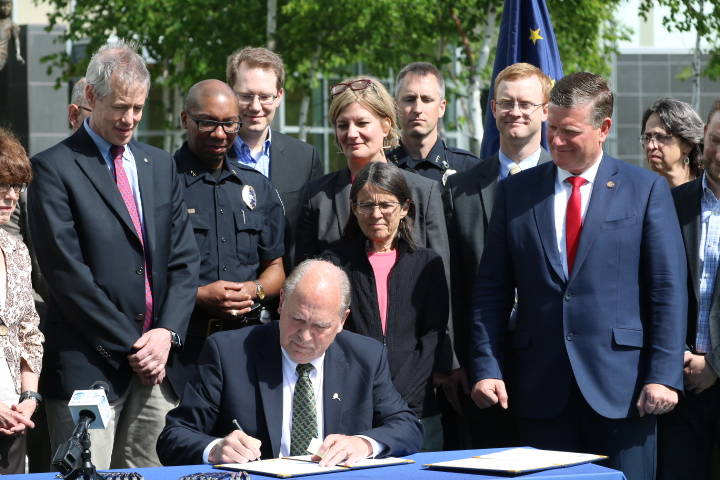Correction: The Office of Victims’ rights, not the Violent Crimes Compensation Board, is in charge of restitution to victims under House Bill 216. This article has been updated to reflect the change.
In a Thursday ceremony at the Anchorage crime lab, Gov. Bill Walker signed a pair of bills drafted by the Alaska Legislature to address a surge in statewide crime.
“It was a really, really great moment in terms of the Legislature and the governor’s office coming together,” said Rep. Matt Claman, D-Anchorage, by phone after Walker approved House Bill 312.
Claman was the prime sponsor of HB 312, which addresses several problems with the policy the state uses for releasing people from jail as they await trial.
The criminal justice reform law known as Senate Bill 91 was enacted by the Legislature in 2016 and included sweeping changes to the way Alaska handles criminal sentencing and suspected criminals in custody. Among its many parts, it created a formula-based matrix for judges to use when deciding whether to release someone from jail before their trial.
That matrix, implemented at the start of this year, has been criticized by members of the public and by some legislators for inflexibility. On social media, some Alaskans — particularly those in Southcentral, which has seen a steep wave of property crime — have deemed it “catch and release” because defendants can be released from prison soon after being charged with a crime.
HB 312 allows judges to consider out-of-state criminal history in that matrix and toughens the approach for defendants charged with vehicle theft and other felonies.
Other clauses increase the financial penalties that must be paid by those who are convicted of crimes, allow the Attorney General to criminalize designer drugs on an emergency basis, and stiffen the penalty for assaulting a medical worker.
The bill had broad bipartisan support in the Legislature, and on a sunny morning, Democrats and Republicans gathered on the crime lab lawn to watch the governor sign the bill. Oddly, the crowd also included Rep. David Eastman, R-Wasilla, who was the only person in the Legislature to vote against the bill.
Claman remarked that the near-unanimity of the Legislature on this issue was a complete turnabout from the divisiveness of last year’s special session, which was called to make changes to SB 91. Ultimately, lawmakers chose to reform SB 91 rather than repeal it entirely, and they took that approach again in HB 312.
“It reaffirms that what we need to do is fine-tune and move forward,” Claman said about HB 312.
Compensation measure signed
Walker also signed House Bill 216, a measure from Rep. Chuck Kopp, R-Anchorage.
That bill allows the Office of Victims’ Rights to pay court-ordered restitution to crime victims as a final option if the defendant is unable or unwilling to pay. That money would come from a criminal fund established in 1988 by the Legislature. That fund collects the Permanent Fund Dividends of convicted criminals and last year contained about $19 million. The state would then require the convicted criminal to repay the fund instead of the victim, ensuring money gets to victims more quickly.
The bill also authorizes grants from the fund to nonprofits that serve crime victims.
Kopp said the fund has gotten away from its original mission and needed to be reprioritized on the needs of victims. In recent years, it has been used to pay the costs of health care for inmates.
“It’s a great day for public safety in Alaska,” Kopp said by phone. (Kopp, a former Soldotna police chief, was a significant cosponsor of HB 312 as well.)
“There’s going to be thousands of Alaskans with long outstanding restitution orders that are going to benefit from this,” he said.
• Contact reporter James Brooks at jbrooks@juneauempire.com or 523-2258.

